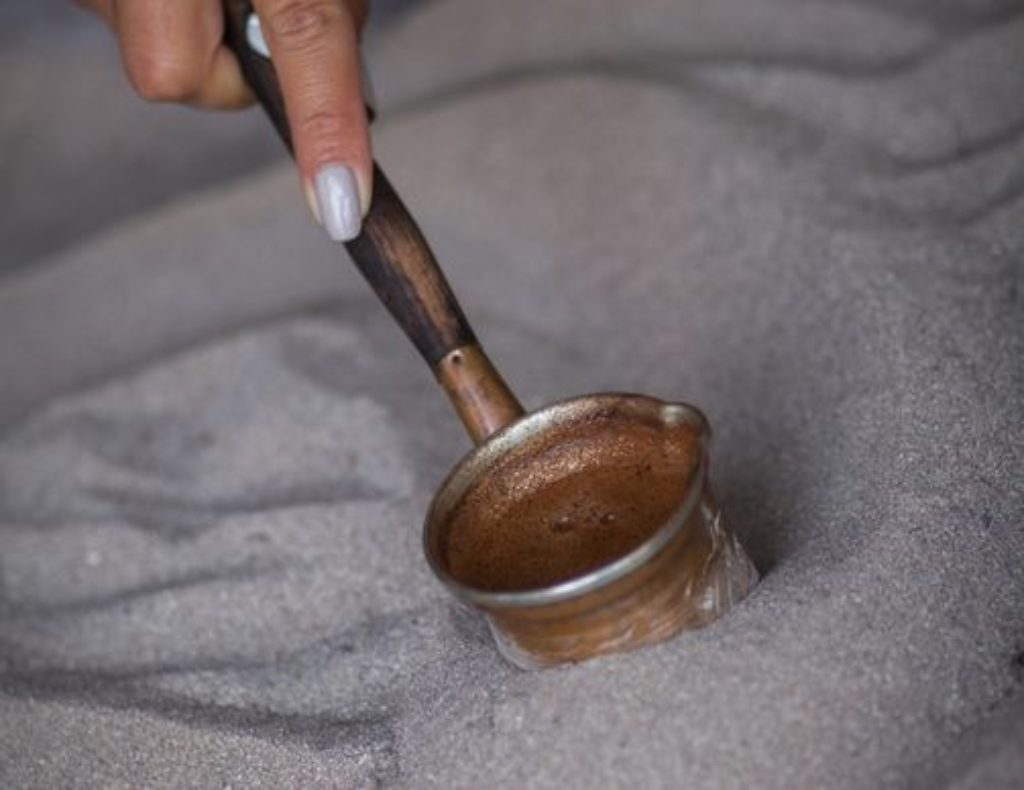Is Turkish coffee healthy? I know you want a simple yes or no, but I’m afraid there’s no straight answer to that.
You are absolutely right to question this beverage though because it’s not your regular cup of joe. Even the way it’s made is an exception to the norm. And as much as Turkish coffee has health benefits, it’s also not without fault, at least according to science.
There’s a lot you probably don’t know about this beverage so here’s my unsolicited advice: Don’t drink it down just yet (or toss it away). Not until you learn about Turkish coffee health benefits, its background, side effects, and consumption limits, among other important things.
I will talk about it all in this article. Let’s get started! Shall we?
What is Turkish Coffee?
Even though it now bears the name ‘Turkish’, this cherished brew has roots in Southern Ethiopia. It’s believed to have been brought to Istanbul in the early 15th century by a Yemen governor who tasted it and loved the experience.
Turks fully embraced the drink, refined it, and now it has been rooted in their culture.
Can it get any more cultural than that for a simple drink? UNESCO actually regards it as part of the country’s culture. Turkish songs, literature, and other cultural elements celebrate it.
Fast forward to today, and this beverage is now prepared in many homes across the globe and sold in many shops around the world due to its unique smell and taste. The fact that it’s unfiltered coffee means it’s exceptionally strong and powerful.

To prepare it, fresh finely ground coffee beans are mixed with small amounts of water and then boiled in a traditional Turkish coffee pot made of either copper, brass, or stainless steel. Locals refer to them as a cezve or ibrik. Thereafter, the brew is poured into a small Turkish coffee cup for serving. A preferred choice for many Turks is the Arabic Kahwa cups also known as demitasse cups.
Sugar and other spices are then added to taste.
Something worth mentioning is that there’s another way to brew this drink and it involves the use of sand. Let’s talk about that briefly.
What is Turkish Sand Coffee?
The definition is in the name. Normally you would use a stovetop to make this beverage but it’s not the only way. The other alternative is to fill a large cooking vessel with sand and then heat it to a very high temperature using an open flame or stove. Insert your cezve or ibirk deep into the sand thereafter and let the coffee brew.

While this is a slower method to brewing Turkish coffee, it produces a much more consistent temperature and leads to a smoother, sweet, and well-balanced drink.
Want to learn more about this traditional brewing process? Check out our article on Turkish Sand Coffee!
Does it pass the health test? Let’s find out!
Turkish Coffee And Health: What Does The Research Say?
Researchers have attributed the health benefits of this Turkish brew to two main things:
- Beneficial compounds found in the beverage such as chlorogenic acids and diterpenoids
- Sufficient caffeine levels
In one study, athletes who drank it performed way better than those who took decaf coffee.
Several other studies have been done to probe the effect of coffee (light, medium, and dark roast) on brain health and conditions such as diabetes, cardiovascular health, cancer, and liver diseases, and in all these areas, the outcome was positive. It does lower the risk of certain diseases while protecting against others.
What The Best Turkish Coffee Promises
If you are going to buy or make Turkish coffee, at least ensure it packs a punch. It should be rich, strong, and robust with a full-bodied taste. It’s up to you whether or not to add the sweet stuff for a custom taste.
Here are the Turkish coffee health benefits that await you.
Better Focus and Improved Exercise Performance
It’s not uncommon to feel alert and energized right after downing a cup of coffee. That’s because it mixes with blood without delay and travels to your brain almost immediately.

The psychoactive effect is way better with the Turkish brew since it holds sufficient caffeine levels enough to amplify your energy level and other cognitive functions such as intelligence, reaction time, mood, etc. For an athlete, this is pretty much the recipe for elite performance.
Protection From And Management of Mental Illnesses
Various studies have shown that the compounds in this beverage can effectively protect the brain from neurological conditions like Parkinson’s, Dementia, and Alzheimer’s disease. It could also be used to manage them.
Immunity From Chronic Diseases
Studies have tied regular consumption of coffee to reduced risk of conditions such as diabetes, stroke, and cardiovascular diseases. People who drink at least one cup of coffee per day reduce their probability of suffering these conditions by over 20%. This has been attributed to higher levels of bioactive compounds.
Improvement of Bowel Movements
Turkish coffee caffeine works together with the proteins in the beverage to improve your intestinal muscle contractions which then leads to better digestive health.

Lower Risk of Liver Dysfunction
According to studies, regular drinking of coffee lowers the risk of liver diseases such as cirrhosis and fibrosis. It can also lower their progression, allowing the patient time to better manage the condition. Just make sure you don’t overindulge because too much caffeine could possibly cause liver damage.

Prevents Cancer and Related Illnesses
This brew is rich in chlorogenic acid and antioxidants (from coffee and spices such as cardamom) that help to prevent the following cancers:
- Colon
- Breast
- Rectal
- Large intestine
- Larynx
- Esophagus cancers
- Prostate cancer
- Endometrial cancer
You can rest assured that moderate consumption of coffee will reduce the probability of you suffering any of these cancers by over 20%.

Better Skin Health and Healthy Hair
The antioxidants in coffee prevent premature skin aging and skin disorders. It’s also used as a treatment for cellulite where it’s mixed with olive oil and applied on the skin.
You can also apply the grounds to your hair. Let them sit for about 20 minutes and then rinse. This will add more shine to your hair.
To enjoy all these benefits, remember not to go overboard. A cup or two every day should be fine. More importantly, make or buy the best Turkish coffee in order to fully experience its greatness.
How Much Turkish Coffee Should You Consume?
How much of this drink you should consume boils down to caffeine levels. Health experts and coffee connoisseurs all recommend that you take less than 400 mg of caffeine a day. That translates to about 6 cups or 13 fluid ounces of this Turkish beverage.
Anything more than that puts your health at risk and causes restlessness and anxiety, sleep disturbance, migraines, cholesterol issues, and insomnia, among other symptoms.
Also bear in mind that Turkish coffee caffeine levels differ from brand to brand and depending on the roast level. More importantly, remember to adjust your coffee recipe according to the roast level so as to avoid instances of under extraction and over extraction.
Drawbacks
As I told you earlier, this beverage isn’t without fault. First things first, it’s unfiltered, so you are looking at compounds such as kahweol and cafestol, both of which are potentially hazardous. Don’t drink the sludge because that’s where most of these compounds lurk.
The caffeine in Turkish coffee is also higher than what you would find in regular coffee. A single serving could have up to 60mg of caffeine. If you have caffeine intolerance, this drink is more likely to bring you side effects such as sleep disruptions and anxiety.
Furthermore, if you sweeten your brew with sugar or other sweeteners, you also double the risk of conditions such as obesity and type 2 diabetes.
That said, normal consumption of this coffee may not harm you. After all, millions of people take it every day and most, if not all, are doing just fine. However, when you have more than enough, that’s when you become more vulnerable to heart problems, blood pressure, ulcers, migraines, fertility problems, and other serious conditions.
How To Drink Turkish Coffee?
In Turkish culture, this drink is served with lokum (a Turkish delight) and a glass of water. It is advised to clear your palette with a glass of water so that you can wash off any lingering flavors from a previous meal as the coffee cools down and the sludge settles.

However, some Turks believe that their ancestors served the water primarily to expose a guest’s appetite. It’s a ritual you might want to familiarize yourself with especially if you plan to visit Turkey or a Turkish family.
Remember not to drink to the last drop. Some of the compounds in the sediment have been found to be unhealthy.
When To Drink Turkish Coffee?
Just to show you how special this coffee is, it even has a dedicated time that you should drink it. Turks do it mostly in the morning after breakfast (I’ll explain) and between meals, especially in the afternoon and after dinner.

You’ve probably noticed that in all these instances, the brew is enjoyed after a meal. You have to eat something first because this is a strong brew that could cause indigestion, heartburn, and cause other uncomfortable symptoms if it finds an empty stomach.
I know you are thinking how dangerous this can be for your sleep if it’s taken in the evening after dinner but guess what, that doesn’t seem to bother its lovers. Try it and you will soon join the party.
Final Thoughts About Turkish Coffee and its Health Benefits
A lot has been said about this celebrated coffee drink from Turkey, but at the end of the day, lots of folks from across the world still set aside time to make or buy one and experience its magnificence.
So, back to the original question: Is Turkish coffee healthy? Like most forms of coffee, it carries many benefits that promote both physical and mental well-being. Because it’s stronger and unfiltered, users get to experience extra benefits such as increased performance.
Even better, it’s one of the few coffee brews that’s easy to prepare at home. But you are welcome to take a trip to Turkey where you can experience it, complete with its rituals and heritage.
Let’s also not forget about its potential side effects. A better way to stay safe would be to only drink it in moderation.
Frequently Asked Questions
What Is So Special About Turkish Coffee?
Of all coffee types, the Turkish variety uses the most finely ground beans. And as much as we now have Turkish coffee machines to help us brew it at the push of a button, the traditional way remains irreplaceable. In fact, none of its rituals have faded yet.
For instance, Turks and most coffee lovers still prefer to boil their coffee in a Turkish coffee pot and serve it in tiny narrow cups. It’s not the type beverage you drink from disposable plastic coffee cups or mainstream coffee mugs.
By now you already know how and when to drink this coffee. Lastly, there’s plenty of Turkish coffee health benefits you will experience when you drink it in moderation.
Is Turkish Coffee Strong?
Compared to regular coffee, Turkish coffee is stronger. It roughly has 25 mg of caffeine in every ounce. Average coffee, by contrast, only has 12-16 mg of caffeine per ounce.
However, the levels of caffeine in Turkish coffee come second to that of espresso, which on average holds around 63 mg per ounce. A single shot of espresso typically has around one fluid ounce.
But since the standard size of a Turkish coffee cup is 2 – 2.5 ounces, the caffeine content in a single serving will be anywhere between 50-63 mg.
What Are The Side Effects Of Unfiltered Coffee?
Unfiltered coffee generally has its benefits and drawbacks. The oils, higher caffeine content, healthy compounds, and impurities make it a two-edged sword, only that one side is a bit blunt.
Put differently, the positives outweigh the negatives. Studies on the side effects of unfiltered coffee are still not conclusive. Nonetheless, it’s important that you remain aware of potential drawbacks, from increased risk of stroke and heart diseases to higher cholesterol levels.







